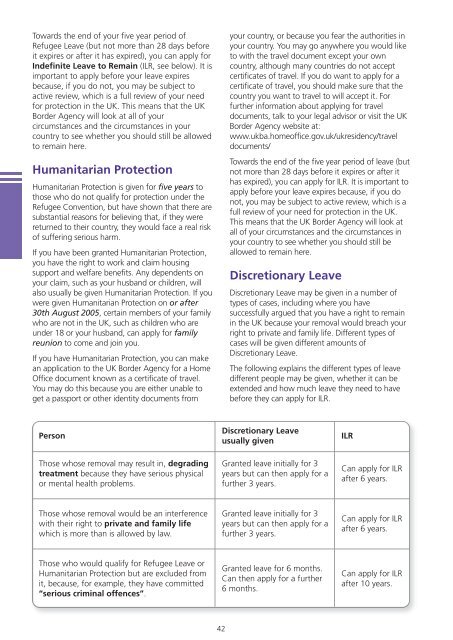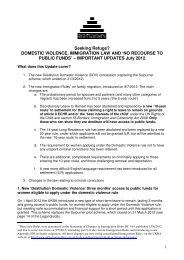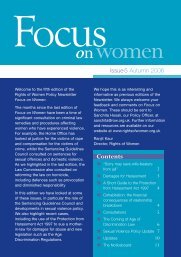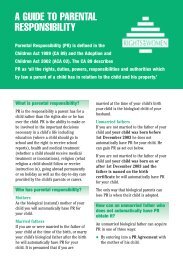Seeking Refuge? - Rights of Women
Seeking Refuge? - Rights of Women
Seeking Refuge? - Rights of Women
Create successful ePaper yourself
Turn your PDF publications into a flip-book with our unique Google optimized e-Paper software.
Towards the end <strong>of</strong> your five year period <strong>of</strong><br />
<strong>Refuge</strong>e Leave (but not more than 28 days before<br />
it expires or after it has expired), you can apply for<br />
Indefinite Leave to Remain (ILR, see below). It is<br />
important to apply before your leave expires<br />
because, if you do not, you may be subject to<br />
active review, which is a full review <strong>of</strong> your need<br />
for protection in the UK. This means that the UK<br />
Border Agency will look at all <strong>of</strong> your<br />
circumstances and the circumstances in your<br />
country to see whether you should still be allowed<br />
to remain here.<br />
Humanitarian Protection<br />
Humanitarian Protection is given for five years to<br />
those who do not qualify for protection under the<br />
<strong>Refuge</strong>e Convention, but have shown that there are<br />
substantial reasons for believing that, if they were<br />
returned to their country, they would face a real risk<br />
<strong>of</strong> suffering serious harm.<br />
If you have been granted Humanitarian Protection,<br />
you have the right to work and claim housing<br />
support and welfare benefits. Any dependents on<br />
your claim, such as your husband or children, will<br />
also usually be given Humanitarian Protection. If you<br />
were given Humanitarian Protection on or after<br />
30th August 2005, certain members <strong>of</strong> your family<br />
who are not in the UK, such as children who are<br />
under 18 or your husband, can apply for family<br />
reunion to come and join you.<br />
If you have Humanitarian Protection, you can make<br />
an application to the UK Border Agency for a Home<br />
Office document known as a certificate <strong>of</strong> travel.<br />
You may do this because you are either unable to<br />
get a passport or other identity documents from<br />
your country, or because you fear the authorities in<br />
your country. You may go anywhere you would like<br />
to with the travel document except your own<br />
country, although many countries do not accept<br />
certificates <strong>of</strong> travel. If you do want to apply for a<br />
certificate <strong>of</strong> travel, you should make sure that the<br />
country you want to travel to will accept it. For<br />
further information about applying for travel<br />
documents, talk to your legal advisor or visit the UK<br />
Border Agency website at:<br />
www.ukba.home<strong>of</strong>fice.gov.uk/ukresidency/travel<br />
documents/<br />
Towards the end <strong>of</strong> the five year period <strong>of</strong> leave (but<br />
not more than 28 days before it expires or after it<br />
has expired), you can apply for ILR. It is important to<br />
apply before your leave expires because, if you do<br />
not, you may be subject to active review, which is a<br />
full review <strong>of</strong> your need for protection in the UK.<br />
This means that the UK Border Agency will look at<br />
all <strong>of</strong> your circumstances and the circumstances in<br />
your country to see whether you should still be<br />
allowed to remain here.<br />
Discretionary Leave<br />
Discretionary Leave may be given in a number <strong>of</strong><br />
types <strong>of</strong> cases, including where you have<br />
successfully argued that you have a right to remain<br />
in the UK because your removal would breach your<br />
right to private and family life. Different types <strong>of</strong><br />
cases will be given different amounts <strong>of</strong><br />
Discretionary Leave.<br />
The following explains the different types <strong>of</strong> leave<br />
different people may be given, whether it can be<br />
extended and how much leave they need to have<br />
before they can apply for ILR.<br />
Person<br />
Those whose removal may result in, degrading<br />
treatment because they have serious physical<br />
or mental health problems.<br />
Discretionary Leave<br />
usually given<br />
Granted leave initially for 3<br />
years but can then apply for a<br />
further 3 years.<br />
ILR<br />
Can apply for ILR<br />
after 6 years.<br />
Those whose removal would be an interference<br />
with their right to private and family life<br />
which is more than is allowed by law.<br />
Granted leave initially for 3<br />
years but can then apply for a<br />
further 3 years.<br />
Can apply for ILR<br />
after 6 years.<br />
Those who would qualify for <strong>Refuge</strong>e Leave or<br />
Humanitarian Protection but are excluded from<br />
it, because, for example, they have committed<br />
“serious criminal <strong>of</strong>fences”.<br />
Granted leave for 6 months.<br />
Can then apply for a further<br />
6 months.<br />
Can apply for ILR<br />
after 10 years.<br />
42
















